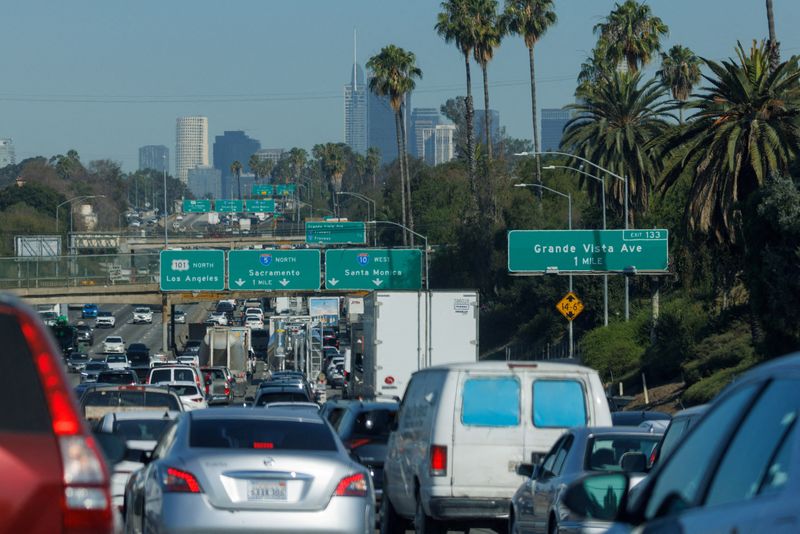
(Reuters) – California regulators will vote on Friday on whether to toughen a policy aimed at boosting low-carbon fuels to slash greenhouse gas emissions from the transportation sector and meet the state’s ambitious climate change goals.
The proposed changes to California’s influential Low Carbon Fuel Standard (LCFS), which has been in place since 2011, would require a deeper reduction in the carbon intensity of transportation fuels by 2030 in order for fuel producers to earn the program’s tradable credits.
Transportation accounts for about 50% of the state’s greenhouse gas emissions.
While biofuel producers and some state climate advocates back the proposal, critics including oil companies and consumer advocates say the change would increase pump prices for Californians. Environmental groups have also argued that the policy would extend the production of oil and gas and prioritize fuels made from food crops instead of encouraging a transition to electric vehicles.
The LCFS requires fuel makers to buy tradable credits if their products generate more carbon emissions than a baseline set by regulators at the California Air Resources Board (CARB). Refiners that produce low-carbon fuels and gases can generate the credits to sell.
The policy set off a boom in renewable diesel and biogas production in recent years that has sent credit prices down to around $70 from above $200 in 2020. The policy revisions are meant to prop up credit prices and encourage more low-carbon fuel production.
Under the proposed amendments, the LCFS would require a 30% reduction in the carbon intensity of transportation fuels by 2030, up from 20% currently. The revisions would also impose a new 90% carbon intensity reduction goal by 2045.
Developers of projects that produce renewable fuels from organic waste support the measures.
“This program represents real reductions in emissions,” Patrick Serfass, executive director of the American Biogas Council, said in an interview. “These are real tons of CO2 that equates to a real credit. And that’s helping to encourage investment by private industry to get more projects built.”
There is concern, however, about the potential for higher gasoline prices.
In an analysis released last year, CARB said the changes could increase the price of gasoline by 37 cents a gallon, on average, from 2024 through 2030. But the board has since said models cannot accurately predict future fuel prices.
CARB’s internal environmental justice advisory committee has urged it to reject the revisions, citing an exemption for jet fuel producers and large subsidies for dairy methane projects, among other concerns.

“CARB staff’s latest proposal does not make the LCFS more equitable, and does not align the program with CARB’s own air quality standards and ZEV goals – instead, it perpetuates reliance on outdated combustion fuels and continues harm to environmental justice communities bearing the brunt of these impacts,” the Environmental Justice Advisory Committee said in a letter to CARB Chair Liane Randolph last month.
One CARB board member, Dean Florez, said publicly this week that he will not support the measure due to concerns about higher costs for consumers.
This post is originally published on INVESTING.





